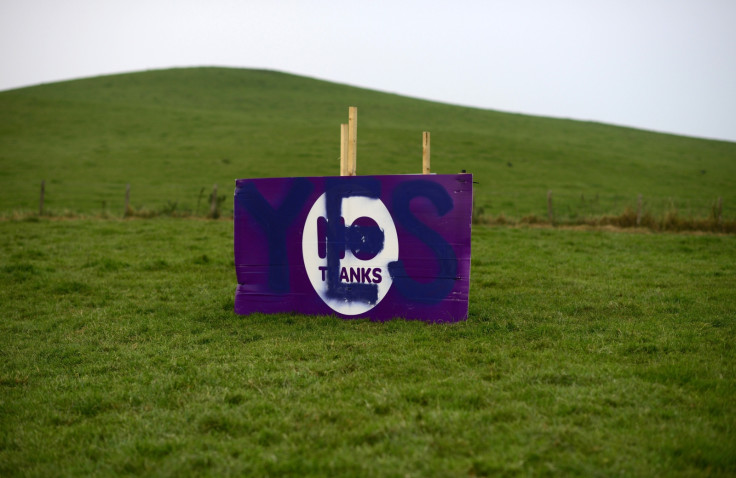Scottish Independence: SG Warns Yes Vote Will Create 'Massive Political Recriminations' and Prompt 'Brexit'

Societe Generale has warned that if Scotland becomes independent there will be "massive recriminations" within the British political landscape, which would possibly prompt the rest of the UK to leave the European Union.
According to the investment bank's latest Global Economics note, analysts hope that "economic rationale" will lead to Scots voting against severing the 307-year old union with England.
"If yes wins then there will be massive recriminations within the UK political establishment which could lead to a challenge to the leadership of David Cameron but he would be expected to survive that," said Michala Marcussen, economist at SG, in the note.
"A Yes is likely to generate instability in financial markets, in which case the Bank of England will offer reassurance about the provision of liquidity in the transition period. A Yes vote to Scottish independence would increase the risk of Brexit- a UK exit from the European Union- with a referendum then more likely to take place in 2017.
"Such an outcome would lower trend potential in both the UK and the euro area. Indeed, for both, the other is the largest trading partner."
Scottish people will vote in an independence referendum on 18 September, 2014, and will be asked the straight "yes/no" question: "Should Scotland be an independent country?"
According to a Survation poll, released on 10 September, 53% of people will vote for Scotland to stay in the UK, while 47% will vote for a union break.
Another poll, released on 9 September, revealed that the respective campaigns battling to decide the future of Scotland were nearly tied.
According to the TNS poll, 39% plan to vote against independence, after support slipped massively from 45%; some 38% of Scots plan to vote for a union break - gaining ground from 32% recorded previously.
The swell in support for independence, recorded by YouGov on 7 September, marked the first time the 'Yes' vote has taken the lead since the referendum was announced.
The poll, which was conducted between 2 and 5 September, showed 51% of the 1,084 surveyed were planning to vote for independence while 49% intended to opt for staying within the union with England.
"The euro area is no safe-haven in the event of a Scottish Yes: Our hope is that in the event of a Scottish Yes vote, economic rationale will take over and drive sensible solutions to the many unanswered questions (EU membership, currency, sovereign debt, banks) during the transition period to actual independence in early 2016," said Marcussen.
"As the initial uncertainty shock lifts, the UK recovery should thus remain on track, which will be a big relief for the already lacklustre growth prospects for the euro area."
© Copyright IBTimes 2025. All rights reserved.






















